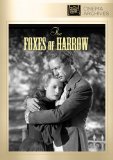| Reviews & Columns |
|
Reviews DVD TV on DVD Blu-ray 4K UHD International DVDs In Theaters Reviews by Studio Video Games Features Collector Series DVDs Easter Egg Database Interviews DVD Talk Radio Feature Articles Columns Anime Talk DVD Savant Horror DVDs The M.O.D. Squad Art House HD Talk Silent DVD
|
DVD Talk Forum |
|
|
| Resources |
|
DVD Price Search Customer Service #'s RCE Info Links |
|
Columns
|
|
|
Foxes of Harrow (Fox Cinema Archives), The
Fun, overripe, bowdlerized adaptation of the forgotten bestseller. Hard-core movie lovers know that the studios' M.O.D. (manufactured on demand) services initiated by Warner Bros.' successful Archive Collection have been an absolute boon to those looking for difficult-to-find library and cult titles not considered commercially viable for mass-market disc printing. So along with Warners, Sony's Columbia vaults and M-G-M, Twentieth Century-Fox joins the M.O.D. market with their Cinema Archives line―and a most welcome addition it is. This week, I've been reviewing several of their introductory titles (Way of a Gaucho and Suez), and next up is The Foxes of Harrow, the 1947 Fox antebellum drama based on the two million-copy bestseller from Frank Yerby, starring Rex Harrison, Maureen O'Hara, Richard Haydn, Gene Lockhart, Victor McLaglen, and Hugo Haas. 20th Century-Fox head Darryl Zanuck broke the color barrier with this one by optioning author Yerby's bestseller, the first time this happened for a African-American author...and then promptly cut out most of the historical fiction's black characters. Still, it manages to score in its entertainingly obvious, melodramatic fashion. No extras for this excellent-looking transfer.
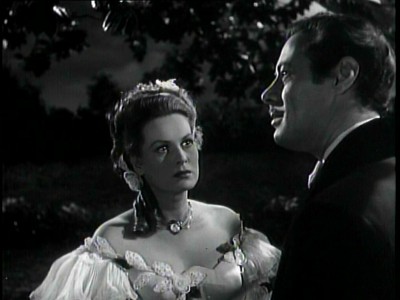
Ireland, 1795. Disgrace has befallen the House of Harrow: a child has been born out of wedlock. The Master of Harrow (Dennis Hoey) promises servant Sean Fox (Charles Irwin) 20 guineas a year to take care of the boy...and to never see his face again. The Mighty Mississippi, 1827. Professional gambler and arrogant scoundrel Stephen Fox (Rex Harrison) has been put ashore on a sandbar, in the middle of the night, for cheating at cards―a virtual death sentence by way of either drowning or at the hands of the river thieves who prowl the Big Muddy. Shady Captain Mike Farrell (Victor McLaglen) happens upon Stephen and picks him up, but Stephen, through charm and the last of his money, buys his freedom. Let off in New Orleans, determined to strike his fortune, Stephen meets Creole swell Andre LeBlanc (Richard Hayden) in a most compromising situation: Andre's money―and his pants―have been stolen by toughs. Aiding Andre and gaining a new friend, Stephen invites himself along to a ball thrown by Creole businessman Viscount Henri D'Arceneaux (Gene Lockhart), where Stephen sees gorgeous, sensual Odalie D'Arceneaux (Maureen O'Hara) again (she spoke to him on the riverboat prior to his being thrown off). Boldly asserting he'll have her after charming her kindly, wise father, Stephen earns the fiery "Lilli's" contempt...which only strengthens Stephen's ardor. Taken to the gambling den La Bourse, Stephen plays German lout Otto Ludenbach (Hugo Haas) in a high-stakes game of blackjack, wiping out the cruel plantation owner, and subsequently killing him in a hastily-arranged duel. Now with a fortune in his pocket and land to build a new Harrow House, all Stephen needs is a proper wife to reinvent his life and avenge past wrongs. But the tempestuous Lilli is having none of it.
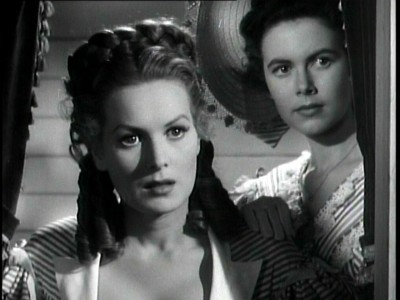
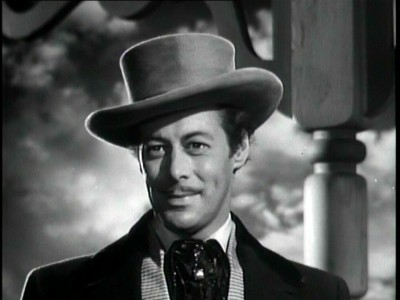
I've never read any of Frank Yerby's books, so I can't say for certain how faithful The Foxes of Harrow is to the author's story (or to his intent), but from some cursory net browsing, it wasn't exactly surprising to see that Fox's movie adaptation excised quite a bit of the large book's content (its entire second half, for starters), while eliminating and rearranging quite a few characters (Hollywood never met a bestseller it didn't think it could "improve"). According to what I read, Yerby was the first black American author to earn a million dollars from his novels, as well as the first African-American to have a work optioned by a major studio for film treatment. The Foxes of Harrow was a major cross-over publishing success in 1946, the year before the movie was produced, which ironically earned Yerby praise from white critics (and some black) for stretching the expectations of what a black author was "allowed" to write about (the book's protagonist was white), and criticism from the African-American community and academia for writing historical novels (automatically considered inferior to "serious literature" by the elites) that either focused on storytelling rather than race issues, or presented black characters with motivations and actions that didn't readily fit into the proscribed "protest" guidelines that dominated mid-century African-American literature.
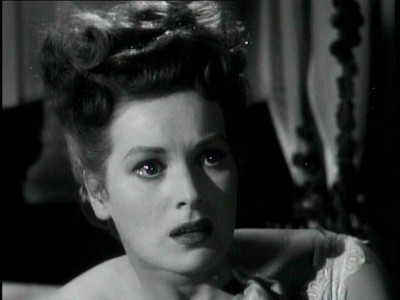
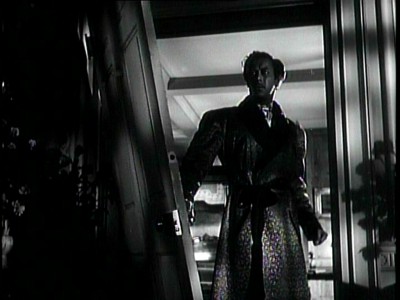
Not having read Yerby, I'm not going to throw in my uninformed two cents about any of that, but I can say, after reading several synopses of the novel, that it seems clear that screenwriter Wanda Tuchock (Hallelujah!, The Champ, Susan Lenox), via Zanuck, largely eliminated most of the racial dynamics that make the novel sound intriguing (the book's whole notion of New Orleans' diverse, ethnically rich populace and the resulting tensions from their interactions, is ignored here), including what looks to be the book's most interesting character: elder slave Tante Caleen (A.C.H. Billbrew). In the book, she apparently has a significant and thematically complex relationship with the book's protagonist, white plantation owner Stephen Fox, while in the movie version, she occupies a brief, fuzzy position as background player/token "atmosphere" threat as a voodoo-practicing slave who may have facilitated the bad mojo that befalls Stephen and his bride. Elements of Caleen's subtly defiant attitude towards slavery have been broadly exaggerated in the script and transposed over to another character, Belle (Suzette Harbin), who is portrayed in the movie as a "noble savage" who would rather kill her child or herself than submit to white man's slavery. As well, in the novel, Stephen's mistress Desiree (Patricia Medina) is a "quadroon" who tempts him away from his marriage; however, in the movie, no mention of this shadowy character's mixed race is mentioned or alluded to, nor is she the catalyst for Stephen's and Lilli's breakup. While Zanuck's 20th Century-Fox frequently showed itself willing to explore heretofore invisible racial and religious themes (Pinky, Gentleman's Agreement), it seems they weren't ready yet in 1947 to tackle some of Yerby's more "forbidden" racial dynamics.
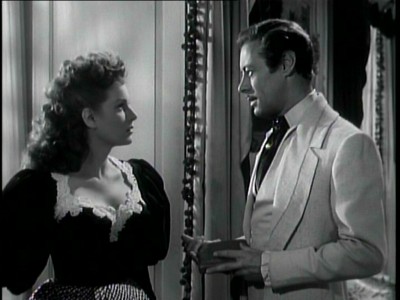
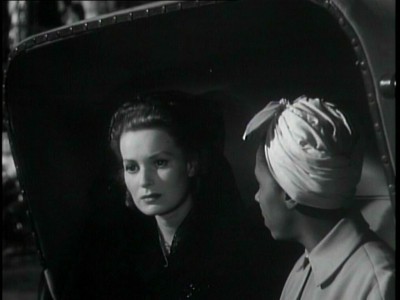
Still...what we're left with here in The Foxes of Harrow is entertaining enough, particularly when witty, self-assured Rex Harrison is on-screen. Long and drawn-out like a good read, this melodrama starts out with an appropriately portentous opening scene―the birth of Stephen, shot in gloomy, doom-laden style by agreeably stiff and stolid director John M. Stahl―before it jumps immediately ahead 33 years and becomes at times a rather amusing comedy of manners, with the upstart Fox making his fortune as he dodges the haughty Lilli's spitted venom (O'Hara, one of my favorites, is also perfectly cast here: always a lady, with that cool, modulated voice...but with a smoldering passion burning beneath that achingly voluptuous body). The highlight of this first section is the D'Arceneaux ball, which Stephen crashes without an invitation, making an open play for Lilli before repeatedly and intentionally insulting her in an effort to break her resistance. Here, stage-trained Harrison is particularly droll, confident in his scoundrel charm, and delivering the screenplay's funny lines with insolent expertise. Switching moods again, The Foxes of Harrow then features a long, tense card game with Stephen and Ludenbach where Stephen wins his fortune and notoriety, before the movie increasingly turns dark, as Stephen finally bags a still-hesitant Lilli and then makes the catastrophic mistake of SPOILER ALERT! forcing himself on her on their honeymoon, after first abandoning her to drink with his friends.
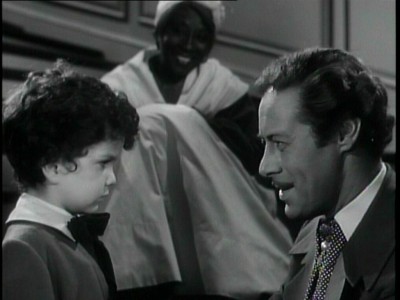
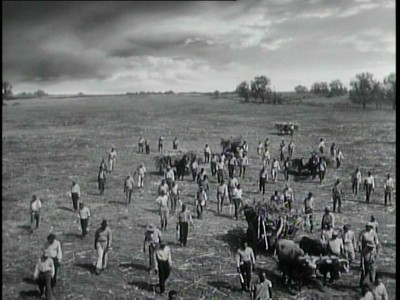
What follows is an increasingly corrosive love/hate relationship, foreshadowed with references to voodoo rites by the watchful slaves, before it's a marriage in name only, with SPOILER ALERT! tragedy striking at the only thing keeping them together: their little boy―an accident caused directly by the hatred Stephen and Lilli express for each other (reportedly O'Hara and Harrison didn't like each off camera...and it shows). By the end of The Foxes of Harrow, children have died, people's fortunes have been wiped out, and nature seems bent on destroying what's left over, as the slaves see the end of the white man's rule (Stahl whips up the hysteria nicely by this point, giving the individual scenes an intense, ill-omened, threatening feel that's perfectly in tune with the overheated exposition). The status quo is of course restored, though, since this is a Hollywood movie, and a tacked-on "happy ending" is summoned up (not too happy for the slaves, obviously). But like a long, involved, pulpy bestseller that's full-bodied enough not to worry about "good taste," The Foxes of Harrow leaves you feeling you've lived a story (no matter how contrived that story is), with characters compelling enough to hold your interest over the long haul. And you can't ask much more from melodrama than that.
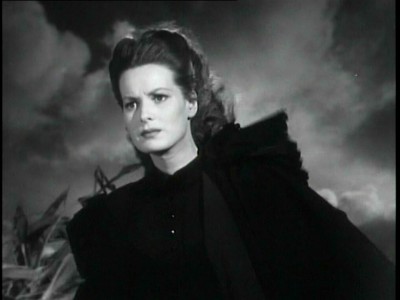
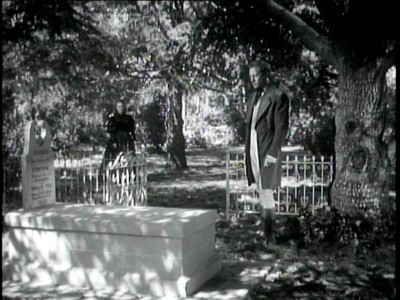
The DVD:
The Video:
The full-screen, 1.37:1 black and white transfer for The Foxes of Harrow looks the best of all the Fox Cinema Archives I've seen so far: solid blacks, sharp image, some grain, and few screen anomalies. Nice.
The Audio:
The Dolby Digital English mono audio track does have minor hiss, but it's perfectly acceptable. No subtitles or closed-captions.
The Extras:
No extras for The Foxes of Harrow.
Final Thoughts:
Long, melodramatic, and entertaining. Zanuck and the filmmakers may have largely cut out author Frank Yerby's more "troublesome" racial dynamics, but enough of his enjoyably pulpy historical histrionics remain to put The Foxes of Harrow solidly in the plus column―aided immeasurably by the expert cast. I'm highly recommending The Foxes of Harrow.
Paul Mavis is an internationally published movie and television historian, a member of the Online Film Critics Society, and the author of The Espionage Filmography.


|
| Popular Reviews |
| Sponsored Links |
|
|
| Sponsored Links |
|
|
| Release List | Reviews | Shop | Newsletter | Forum | DVD Giveaways | Blu-Ray | Advertise |
|
Copyright 2024 DVDTalk.com All Rights Reserved. Legal Info, Privacy Policy, Terms of Use,
Manage Preferences,
Your Privacy Choices | |||||||









